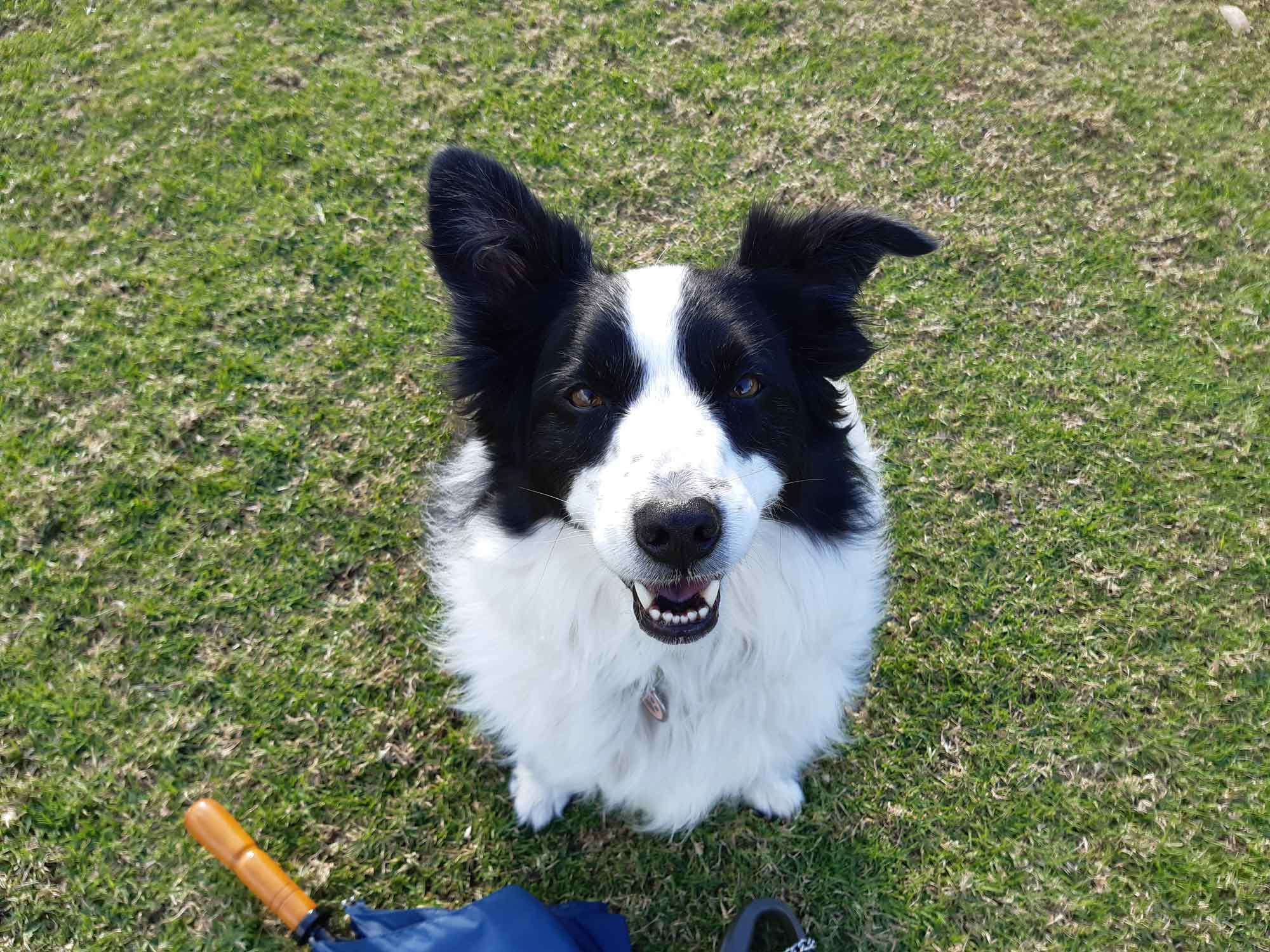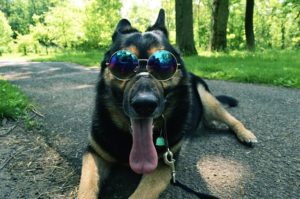Dogs as Experts on… Emotional Confidence?
By: Grazyna Witkowska Date: 23rd October 2019


Some 6 months ago I had the pleasure of spending a lot of time with Jaye, a gorgeous Border Collie. Her people were away and I took her to the park every day. Spending time with animals and spending time in Nature is always magical but this time I became fascinated with how dogs interacted with each other in a dog park.
In a park they are off the leash and they can do what they want. When they meet and greet for the first time they start with a tentative side-of-the-neck sniff. If that goes well then it is permitted to sniff along the side of the body… and maybe even under the tail. “OK, now we know who we are”.
And the next step is what I want to focus on. At that point, after the preliminary sniffing, one dog might just return to what he was doing and no longer pay attention to the other dog. The other might follow for a while as if saying “Play with me!”. But as the first dog keeps going away the other’s interest fades and he focuses on something else.
It’s like speed-dating for dogs where they can decide in under 20 seconds whether they want to hang out together.
It’s amazing to me. They don’t take disinterest from the other dog personally. They can stay open to opportunities rather than be fixated on a particular outcome. I like to think of this dog behaviour as ‘emotional confidence’. Confidence that: “I am ok and you are ok and we either can hang out together or not.”
No, I am not claiming that I know for sure this is what dogs are thinking. And yes, I have seen dogs smitten with other dogs in a park. All I am saying is that I have observed a particular behaviour that inspired me to reflect on how it would be for me if I acted more often along those lines: “It is ok if you like me and it is ok if you don’t”. Not feel that I am worth less because the other didn’t give me more attention. And not feel guilty when I don’t give another person more attention just because they would have liked it.
 And yet, I find myself pushed and pulled in my social interactions because of what I have been taught as a kid, because what I have been groomed is the appropriate behaviour in a given circumstance.
And yet, I find myself pushed and pulled in my social interactions because of what I have been taught as a kid, because what I have been groomed is the appropriate behaviour in a given circumstance.
Soon after thinking about these things, an answer to my quandary presented itself… in a form of a client.
This client was concerned that they are not sure what they want and it was hampering their ability to make decisions, short- and long-term.
It is a good thing to have clarity on what one wants. So, we set a goal of: “I know what I want”. (To set the context of the therapy session, a goal describes the outcome to be achieved. It is stated in a positive way and in a present time). When I tested the client, their body (through muscle testing) said that the client already knew what they wanted. And yet, at the same time, the client was saying that they wished they knew. So, I started to suspect that they knew on the unconscious level but not the conscious one. When we modified the goal to: “I know what I want and I am aware of it,” that’s when I detected the muscle response telling me that the client has not yet achieved that goal and we can work on it.
Hurray! So, dogs must be more clear about what they want! And that’s why they can make their choices in no time, and with no inner turmoil!
And we too can be like this! The key is to allow ourselves to access our full truth about the situation and not be blinkered by what we are supposed to think, do, or look at.
To do this we need to consult our Conscious Mind and our Unconscious Mind.
Our Conscious mind is what we mainly use in our waking state to make rational decisions. Yet, the Conscious Mind is only able to pay attention to 5+/-2 elements of information at a time. And yet, our Unconscious Mind (who governs our life processes, such as: breathing) is able to hold and access much larger quantities of data. The trick is that while accessing the information in our Conscious Mind is as easy and immediate as accessing information in the Random Access Memory (RAM) of our computer, the information in our Unconscious Mind seems more like computer’s external memory. It needs a different request. In a therapy session or in meditation we cultivate what is often termed ‘relaxed and focused’ state of mind. And in this state we can connect to our Unconscious Mind more easily and reach the information that eludes us in our busy waking state.
Animals, generally, have much better connection between their Conscious and their Unconscious Mind which allows them to use their instinct to the fullest.
If you want to try out at home what kind of new thoughts and new associations you can make when you allow yourself to enter into the ‘relaxed and focused’ state – try this simplified, and yet, potent process:
When faced with a complex decision find a quiet place where you won’t be disturbed for at least 30 min. Take a pen and paper with you and put it in an easy reach.
Take a few deep breaths and allow your body and mind to relax. Use any relaxing technique that works for you.
If you haven’t done this before, imagine that:
You are sitting on the bottom of an ocean, you are very comfortable and You are able to breathe with ease;
Feel the swaying of the ocean swell on your body and observe your breath;
As you breathe out notice how your outbreath makes tiny bubbles rising and rising through the water towards the surface;
Keep paying attention to your breath. Know that you are safe. Relax.
When you feel you have reached the ‘relaxed and focused’ state, think of the options for your decision-making. Jot down the pros and cons of each (there may be more than 2). Jot down whatever comes to mind without censoring yourself.
Ask yourself for each of the choices how does that choice fit into a pattern of the choices:
you made to-date
people around you make
Muse over those questions only jotting down thinks that seem to create a definite ‘aha!’ moment in your mind.
Ask yourself what might be the underlying wisdom or fear that could be responsible for this pattern.
Future pace by imagining how each choice is likely to unfold into the future and, very importantly, notice how this outcome makes you feel and how it could affect other stakeholders.
If neither of the options make you feel good after you completed step 5, see whether you can think of new options. If not, ask you Unconscious Mind to work on it and let you know what these are in an appropriate moment. Then give yourself a week or two and repeat this process.
I bet that following this process will make you reject some choices that seemed ideal at the very start.
Do not shy away from making choices that are a product of your good upbringing.
Your past grooming and your past experiences are part of your tools that help you live your life to the fullest. You do not have to reinvent the wheel.
For more information or to discuss the professional help options ring me and book a free chat.

Grażyna Witkowska - Kinesiology and Hypnosis
Copyright @2018 - Best Versions Of Us - Developed by BWebSeen

